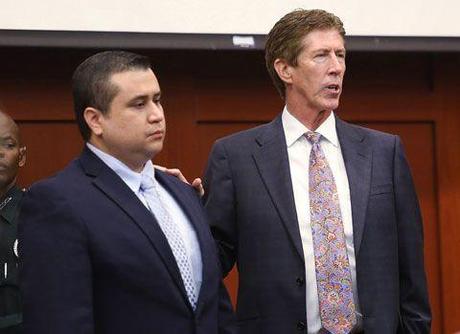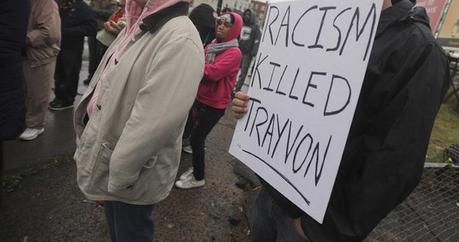 By Alan Bean
By Alan Bean
If you were hoping the big fuss over Trayvon Martin was going away, this weekend’s March on Washington 2 was a rude wake-up call. Speaker after speaker pointed to the Zimmerman-Martin saga as an example of why Dr. King’s dream is yet unfulfilled.
A host of white opinion leaders have argued, with some justification, that the Zimmerman trial devolved into an unsightly media circus. Sure, the media exploited this story, the way they exploited the carefully orchestrated outrage perpetrated by Miley Cyrus a couple of days ago, but they didn’t create it.
The media flocked to this story because millions of African Americans see Trayvon Martin as the new Emmett Till.
In 1955 the issue was lynching; in 2013 it’s racial profiling and stand your ground laws.
If you’re thinking the issue would be settled by a jury verdict, remember that Till’s murderers were also acquitted by a jury of their peers.
But wasn’t Trayvon Martin a little thug? Didn’t he initiate the fight? Didn’t he have the well-intentioned Zimmerman fearing for his life? Didn’t Trayvon’s pot-smoking past justify Zimmerman’s profiling? Isn’t this whole story a saga invented by race-baiters like Al Sharpton and Barack Obama? Haven’t there been a series of black-on-white crimes much worse than anything Zimmerman did that have been ignored by the race-baiters? Aren’t black people just trying to change the subject from their high drop out rates and single-parent family problem?
If you are asking these questions (and, Lord knows, some of you are) please read this post from Craig Watts that recently appeared on the excellent RedLetter Christians blog.
Beyond Trayvon Martin and Racism
Posted AUG 14 2013
by CRAIG M. WATTS

No doubt there have been acts of violence more horrible than Trayvon Martin’s case. And no doubt there is black on white violence as well as white on black violence, though most killings by far involve people of the same race. And certainly innocent people of all races have been killed.
Still there are differences in Zimmerman’s killing of Martin, differences that rightly led to the national attention.
The day after the court decision I was in Orlando, Florida where I was visiting with two men –one of them a minister- who were attending the NAACP national meeting. “It wouldn’t have gone down this way if Zimmerman was black and Trayvon was white,” remarked one of them. “The police wouldn’t have failed to arrest an armed black man who tracked down an innocent white kid, caused a fight with him and then pulled out a gun and killed him. The police would likely shot the black man right there.”
No one can know for sure what the police would have done. But the scenario the man described is not at all farfetched. And it wouldn’t have made national news. Unfortunately, many white people –like those who make the questionable comparisons- have not even considered the matter from the perspective of a black man. (1) A young black man had done nothing wrong. (2) He was tracked down by an armed man of another race for no other reason than that the young man was black and therefore viewed with suspicion as a white young man would not normally have been. (3) The armed man provoked an unnecessary confrontation. (4) In the midst of a fight the armed man pulled out his weapon and killed the innocent black young man. (5) Police did not arrest the killer until there was a public outcry. (6) When the killer when to trial, he was declared “Not Guilty.”
Those who object to the attention given to the killing of Trayvon Martin and who continue to post stories of doubtful similarity to Martin’s case on Facebook or send them in emails fail to see that those six characteristics are essential to the whole issue. Too many people the attention given to Zimmerman’s killing are simply in denial about enduring and still pervasive problem woven into the nation’s social fabric: racism.
I’m hesitant to simply label all these people as racists who point to other incidents of violence and make questionable comparisons. But I do believe a certain kind of moral myopia is at work, hindering their ability to see what’s going on. What appears as racism is often an expression of a broader problem: the failure to have sufficient empathy and compassion for people outside of one’s own circle, not only of race, but of class, nationality, sexual orientation and others crucial aspects of identity. This failure accounts for the apparent inability of some to even begin grasp the real issues at stake when discrimination and inequality come into play and even to blame the victims who are not like him or herself.
Sadly, this failure is far too prevalent among American Christians. Love, kindness, and compassionate understanding are present in them. But they don’t extend it in fullness to those who are not like them. Jesus sought to address this problem in the parable of the Good Samaritan (Luke 10:25-37). Loving our neighbors involves more than care for people who are like us. The circle of care and understanding must extend even to people who have been perceived as at odds with “our kind” of people. Suspicion must be put aside.
This matter is beyond racism. The failure to have sufficient empathy and compassion for people outside of one’s own circle, not only of race, but of class, nationality, and sexual orientation is a failure of moral imagination. We can’t “weep with those who weep and rejoice with those who rejoice” (Romans 12:15 ) if we can’t or won’t get out of our own shoes and imagine ourselves in their place. More likely we will minimize their suffering and troubles or attribute the misfortune to the people’s own personal flaws. We will insensitively judge and tend to be self-righteous.
Attitudes toward the poor among many people in the United States display this same lack of empathy and compassion. Too many blame the poor for their plight and assume their problems are the result of laziness or moral failings. In other words, they blame the victims rather than seek to sympathetically understand the struggles and suffering of those who are disadvantaged. Self-righteous judgmentalism overshadows merciful traits found in the way Jesus dealt with the poor.
Christians will not be agents of reconciliation and healing as long as they see the world from the perspective of the privileged or fail to even attempt to see from the viewpoints for those who are unlike themselves in important ways. We have a higher calling than simply to be representative of our race, class, nationality or whatever else defines us in this world. “As God’s chosen ones, holy and beloved, clothe yourselves with compassion, kindness, humility, meekness, and patience” (Colossians 3:12).
